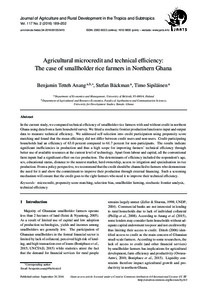| dc.date.accessioned | 2016-10-04T08:27:48Z | |
| dc.date.available | 2016-10-04T08:27:48Z | |
| dc.date.issued | 2016-09-20 | |
| dc.identifier.issn | 1612-9830 | |
| dc.identifier.issn | 2363-6033 | |
| dc.identifier.uri | urn:nbn:de:hebis:34-2016061350415 | |
| dc.identifier.uri | http://hdl.handle.net/123456789/2016061350415 | |
| dc.language.iso | eng | |
| dc.publisher | Kassel University Press | ger |
| dc.rights | Urheberrechtlich geschützt | |
| dc.rights.uri | https://rightsstatements.org/page/InC/1.0/ | |
| dc.subject | microcredit | eng |
| dc.subject | propensity score matching | eng |
| dc.subject | selection bias | eng |
| dc.subject | smallholder farming | eng |
| dc.subject | stochastic frontier analysis | eng |
| dc.subject | technical efficiency | eng |
| dc.subject.ddc | 630 | |
| dc.title | Agricultural microcredit and technical efficiency: The case of smallholder rice farmers in Northern Ghana | eng |
| dc.type | Aufsatz | |
| dcterms.abstract | In the current study, we compared technical efficiency of smallholder rice farmers with and without credit in northern Ghana using data from a farm household survey. We fitted a stochastic frontier production function to input and output data to measure technical efficiency. We addressed self-selection into credit participation using propensity score matching and found that the mean efficiency did not differ between credit users and non-users. Credit-participating households had an efficiency of 63.0 percent compared to 61.7 percent for non-participants. The results indicate significant inefficiencies in production and thus a high scope for improving farmers’ technical efficiency through better use of available resources at the current level of technology. Apart from labour and capital, all the conventional farm inputs had a significant effect on rice production. The determinants of efficiency included the respondent’s age, sex, educational status, distance to the nearest market, herd ownership, access to irrigation and specialisation in rice production. From a policy perspective, we recommend that the credit should be channelled to farmers who demonstrate the need for it and show the commitment to improve their production through external financing. Such a screening mechanism will ensure that the credit goes to the right farmers who need it to improve their technical efficiency. | eng |
| dcterms.accessRights | open access | |
| dcterms.bibliographicCitation | In: Journal of Agriculture and Rural Development in the Tropics and Subtropics. Kassel : Kassel University Press. - Vol. 117, No. 2 (2016), S. 189-202 | |
| dcterms.creator | Anang, Benjamin Tetteh | |
| dcterms.creator | Bäckman, Stefan | |
| dcterms.creator | Sipiläinen, Timo | |
| dc.description.everything | Gedruckte Ausg. im Verlag Kassel Univ. Press (www.upress.uni-kassel.de) erschienen. | ger |

